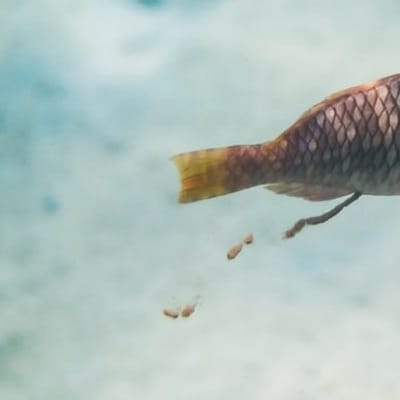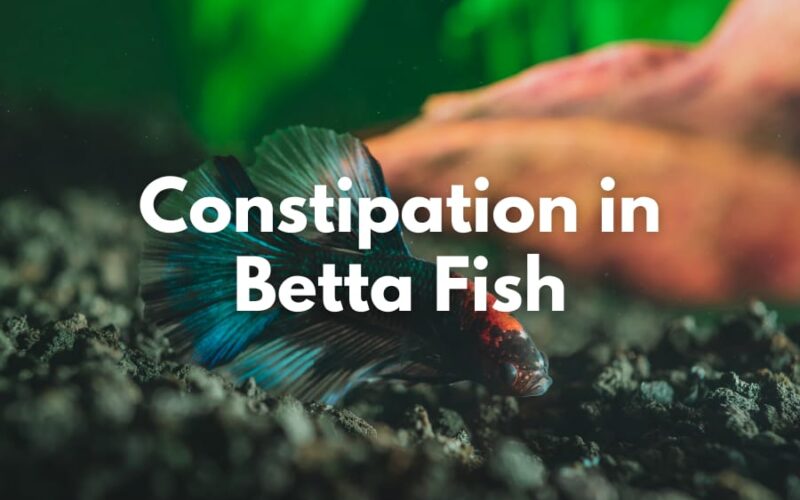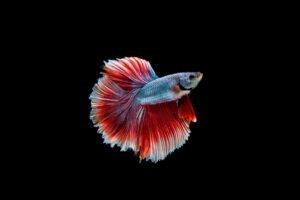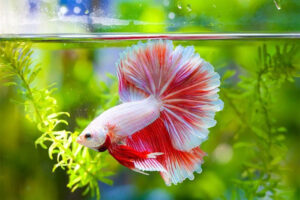When it comes to keeping betta fish as pets, one of the main problems is constipation. If you deal with betta constipation, do not take it lightly.
Constipation is not a pleasant thing to deal with, whether as humans or pets. If you think it will get away soon without any treatments, then it is a big mistake.
The good thing is betta fish constipation can be treated easily. You need to identify it carefully, though, since the symptoms may look similar to dropsy.
Dropsy is another health problem for betta fish, but it is more dangerous. It is even more lethal if you give the wrong treatment for the wrong health problem. Your betta fish could die.
The Causes for Betta Fish Constipation
So, what may cause your betta buddy to suffer from constipation? In short, poor diet is the main cause for your betta fish poop to fail to come out easily. Just like us humans, betta fish need enough fiber too.
Since they are carnivorous, dealing with this matter can be quite tricky.
Here are some of the poor diet examples that may cause constipation on your betta fish:
Feeding only or too much flake/freeze-dried foods
Flake/freeze-dried foods may be easy menus for your betta fish. However, they do not offer enough fiber that your fish need. Because of this, your betta fish suffers from constipation.
You can still feed your betta fish with flake/freeze-dried foods. The key is to soak them a little first before giving them to your fish. That way, these foods are more easily digested by them.
You can also combine their menu with pellets. That way, they get enough fiber and do not have to eat dried foods all the time.
Lack of live foods on their menu
Giving pellets may be the quickest and easiest solution. It can be part of your betta fish constipation treatment.
Still, nothing beats other real live animals in terms of fiber. After all, betta fish is carnivorous. They need fresh meat from other creatures too. If their prey has been eating enough fiber, then betta fish can get that directly from their stomach too.
Some of the live foods you can give them include daphnia and mosquito larvae.
You are giving too much bloodworm
Just like a carrot for rabbits, bloodworm should only be a treat for your betta fish. Yes, they also contain enough nutrients for them.
However, giving too much of them does nothing good for your betta fish. It will give your pet a hard time when releasing betta fish poop.
Feeding too much
Besides being carnivorous, betta fish are also known to be gutty. Even if they are already full inside, they continue eating when they see foods before them. Thanks to their lack of impulse control, they are more prone to constipation.
You cannot expect your betta fish to learn how to stop eating. You should have a regular meal schedule for them and stick to it. Feed them only twice a day. Each should only last for two minutes. No need to worry about getting them hungry because that portion is enough.
The Symptoms for Betta Fish Constipation
Before you need to know how to treat betta constipation, learn to spot the symptoms first. The quicker you know, the sooner you help your betta fish before things may worsen.
So, here are some of the symptoms to show that your betta fish is suffering from constipation:
Their feces are stringy

If your betta fish is normal and healthy, their poop will sink right away once it is out. Betta fish poop will look stringy and hang from them if they suffer from constipation. Once you spot this symptom, treat your betta fish right away.
They do not eat, or they spit their foods out
This symptom is rather vague but could be another indicator. If your betta fish lacks appetite with the foods before them, do not rely on this sign alone. It could be a symptom of other illnesses they may suffer at that time.
When you see your fish does not eat or spit their foods out, watch out. Once you find other indicators that they may suffer from constipation, it is time to help them.
They seem lethargic or not swimming well
It is another vague symptom but still considerable. Imagine yourself overeating. Indeed, you do not feel like moving around that much.
The same case happens to your betta fish if they overeat. If they do not seem to swim actively or lethargic, it can sign constipation.
Just like the last symptom, you may need to check out other indicators. Lethargy may also be a symptom of other illnesses your fish may suffer at that moment.
Their belly is bloated
Do not be surprised if your betta fish looks bloated in their belly. That is because they have trouble releasing their feces. It is a common constipation symptom. This symptom may be confused with dropsy – another common health problem betta fish may suffer too.
To tell the difference between betta constipation with dropsy, check out the fish scales. If they happen to be sticking out, then it is an obvious sign of constipation. It would be best if you started treating them right away.
This condition is also called swim bladder disease. Besides constipation and dropsy, this health problem can also be caused by an injury. Since the injury causes its internal organs to swell, this will bloat their belly too.
Before you start any treatments, make sure you are well-aware of what may cause swim bladder disease.
To be on the safe side, consult with your vet as well. From there, you can know what to do next.
They do not have enough exercise
Who says only humans and mammals need regular exercises? Betta fish – just like other active fish – need enough space for them to swim around. If their tank or aquarium happens to be too small, then that is a problem.
Since they cannot move so much, it does not help with their digestive systems. That will give them constipation.
Then how to make sure your betta fish gets enough exercise in the tank? Make sure that the tank is bigger than five gallons of water. It should be even bigger if your betta fish lives in the communal tank. They will have to share their space with other fish in it.
Once your betta fish can swim around with enough space, then that will help to avoid them suffering from constipation.
In some cases, they struggle when swimming
Another sign of your betta fish constipation is how much they struggle when swimming. Your poor fishy friend is feeling uncomfortable when that happens. This symptom is also a red alert for you because your fish starts having swim bladder disease.
If your betta fish has got to this stage, start learning more about swim bladder disease too. Hopefully, your fish does not have other illnesses. If they have more severe health problems besides constipation, you should seek different betta fish treatments. Remember, mistreatment may lead to a fatal result.
Once your betta fish is suffering from constipation, it is time to get the proper treatment. The right treatment will cure betta fish constipation.
The Treatment for Betta Fish Constipation

There are plenty of ways to deal with the betta constipation problem. The most common one is to feed your fish with more food rich in fiber. It works wonders if your fish only suffers mild constipation – and this method is like their first aid kit.
Epsom Salt is another cure for your betta fish when they suffer from constipation. Epsom Salt works wonders as a relaxant to the fish muscles. That will help them to release their feces more easily.
1. How To Cure Betta Fish Constipation With Epsom Salt
Before we carry on, please bear in mind this one important thing: Epsom Salt is only used if peas or other foods rich with fiber do not do the trick. This mild muscle relaxant works effectively if you follow these steps:
- Get rid of some of the water from the tank. Move it to a clean tank.
- Have a teaspoon of Epsom Salt per five gallons of water in the container.
- Stir well until Epsom Salt dissolves into the water.
- If your betta fish shares their tank with other fish, you may need to separate them to another tank first. It means you must prepare a quarantine tank for them.
- Quarantine your sick betta fish in this separate tank for at least a week. If their constipation problem lessens or is cured less than that, then you may return them to the communal tank.
Epsom Salt is not the only solution to treat betta constipation. Next, we will see that there are other methods to cure your betta fish.
2. Other Methods to Treat Betta Fish Constipation
Since Epsom Salt often comes to mind first for your betta fish constipation, you may miss these two (2) other methods. They can also be tried to cure your betta fish:
- Your betta fish should be fasting for 2/3 days. No worries, it is not cruel. After a couple of days, when they get better, you can start feeding them again.
- Fiber foods, like Daphnia, can be the option to cure fish constipation.
If you do this as quickly as you spot the symptoms, you may not need to take your betta fish to the vet. The emergency has been handled well.
How To Prevent Betta Fish Constipation From Happening
Once you know how to treat betta constipation, you know what to do next. Next time? Wait, surely you do not wish for your pet to suffer the same thing more than once. Let’s hope that it will not come to that.
Still, preventing betta fish constipation is so much better than treating it later. Your fish stays healthy, and you can allocate your time and energy for something else.
Still, how do we make sure that our beloved betta buddy stays healthy? Here are some of the preventative methods:
Your betta fish needs fasting
Do not wait until constipation occurs. Occasionally (well, at least once a week or so), get your betta fish to do fasting. After two to three days, you can start feeding them again.
This method gives them time to clear off their intestines. It helps them to poop more easily. Their feces will not be stringy.
Do not feed your betta fish too much
As mentioned earlier, feeding your betta fish too much will lead to constipation. Betta fish are naturally gutty creatures.
Their lack of impulse control makes them unable to stop right away when they are no longer hungry. Worst of all, they only stop when they suddenly feel sick in their stomach.
The portion should not be too big. Only feed your betta fish twice a day in a matter of minutes. After that, leave them be.
Provide your betta fish with a variety of diets
Besides overfeeding, lack of variety in their diets is also the reason why betta constipation happens. A varied menu will do to prevent constipation from occurring. Besides dried foods feed your betta fish with live creatures like Daphnia. That will give them enough fiber too.
You may need to get a bigger tank or aquarium
In some cases, betta fish constipation may not have anything to do with foods. If your tank or aquarium is less than five gallons of water, you may need to buy a much bigger one.
You need more space, especially if your betta fish live in a communal tank. If they say size does not matter, it does in this case. The bigger, the better, and the healthier the environment is for your betta fish. (Yes, all other fish are included too.)
How Dangerous Is Betta Constipation for Your Fish?
In humans, constipation may not be that dangerous. It can be dealt with immediately once the symptoms are there.
For your betta fish, it will be unpleasant for them. Although constipation is not a severe issue, it may worsen if you do not treat it immediately. If you treat it too late, chances are your betta fish may suffer from swim bladder disease.
Then gradually, your betta fish will have a much weaker immune system. If it ever comes to that, your fish will be prone to other more fatal infections or diseases.
In other words, your betta fish may die from other infections or diseases – due to their weakening immune system. Yes, the weakening immune system is caused by betta fish constipation.
That is why you must not take constipation suffered by your betta buddy so lightly. The sooner you spot the symptoms, the sooner you must act. That way, it will not take so much time to cure betta fish constipation. You can allocate your time and energy to something else.
The Conclusion
Yes, caring for your betta fish requires quite hard work. To sum it all up, here are some pointers that you need to remember:
- Watch their diet. If its menu is varied from time to time (with more fiber, less dried foods), then betta constipation can be avoided. It is the biggest cause of constipation.
- Still related to the first point, let’s not give your betta fish blood worm all the time. That may also give them some serious constipation.
- Bloated belly and stringy feces are the most obvious symptoms of betta fish constipation. For a bloated belly, you may need to check out other possibilities besides that.
- Other symptoms for their constipation include spitting their foods out or losing interest in eating. Since betta fish normally eat if you do not limit their meal portion, you had better watch out for this. It does not mean they are well.
- There are methods to cure betta fish constipation. Yes, you can use Epsom salt. You can also change their diet by giving them more fiber (like live foods). If necessary, make them go on a two or three-day-diet. It will help to clear their intestines.
Finally, do not let your betta fish suffer too long with constipation. They will be more vulnerable to other infections and illnesses.



